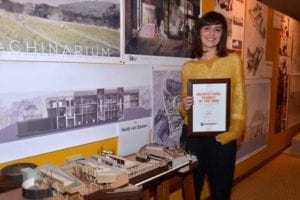The top thesis students from the country’s eight universities who demonstrate holistic competence will showcase their talents at the Corobrik Architectural Student of the Year National Awards in April.
“These annual awards aim to promote and reward design excellence amongst students whilst encouraging a broadening in understanding of the environmental issues and their resolution. Through discourse around thesis projects design paradigms are inevitably challenged and new design ideas evolve giving depth to architectural resolution while building technical skills sets required by architects of the future,” said Corobrik’s Christie van Niekerk during the award ceremony at Nelson Mandela Metropolitan University (NMMU). Prizes were awarded to the universities’ top students, with the winner going on to represent their university at the national award event. NMMU’s winner was Mientjie van Niekerk. Her thesis titled “A platform for trade and interaction” proposesthe creation of a new town centre in Opuwo, Namibia with an essential oil processing plant as the catalyst project. The platform would comprise an essential oil distillation plant, an informal market and a cattle trading area for the Ovahimba people of Opuwo.Heidi van Eeden will go forward to compete for the national award for the University of Pretoria with her thesis, “Machinarium: Architecture as a living machine; a 21st century textile mill.” The project is an investigation of the potential of industry as an urban catalyst – a mechanism with which to regenerate urban environments and re-integrate fragmented socio-ecological systems.
The investigation is focused on the re-structuring of the textile industry, and is contextually based in an ‘urban wasteland’ – the Daspoort Wastewater and Sewage treatment Works – in an attempt to redefine modern concepts of waste and mitigate the flood of pollution emanating from 20th century industrialisation. Allin Dangers, Corobrik Director of Sales Inland Region says they are looking for a deepened sensitivity towards all three pillars of sustainable development – the environment, the economy and our social fabric. This has to be seamlessly combined with practical solutions to a particular architectural challenge and with artistic flair that embodies the spirit of the vibrant South African nation. “Our intention has always been that this programme should inspire design excellence but the complexities of the global environment today demand a far broader vision from our students.” The national winner will be announced and presented with a cheque for R50 000 at the National Student Architect awards function in Johannesburg on 9 April.






